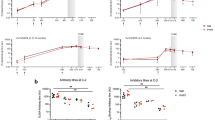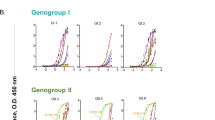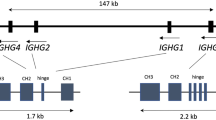Abstract
IGG in bovine sera generally consists of a mixture of the two subclasses IgG1 and IgG2. While testing the reliability of the radial immunodiffusion (RID) method for quantifying IgG in bovine body fluids1, we found a discrepancy. With most sera tested, the combined amounts of IgG1 and IgG2 determined using subclass-specific antisera was equal to the amount of IgG determined with class-specific antisera against γ determinants, that is common to IgG1 and IgG2. But with a few sera the amounts were not equal (unpublished results). (Class-specific antisera against γ determinants were produced by removing antibodies against subclass determinants on immunoadsorbent columns, starting from antisera which contained antibodies against both class (=γ) and subclass (=γ1 and/or γ2) determinants.) Using immunoelectrophoretic (IE) analysis, we have now shown that those sera contain a ‘fast’ IgG component as well as both IgG subclasses. The third component was represented by an arc in the anodic region of the precipitation pattern, and it proved partially identical to that of IgG1 (Fig. 1). Such an arc can be seen in a photograph of IE patterns of sera from calves infected with Trypanosoma vivax, although the arc is not mentioned in the report2.
This is a preview of subscription content, access via your institution
Access options
Subscribe to this journal
Receive 51 print issues and online access
$199.00 per year
only $3.90 per issue
Buy this article
- Purchase on Springer Link
- Instant access to full article PDF
Prices may be subject to local taxes which are calculated during checkout
Similar content being viewed by others
References
Bokhout, B. A. J. Immun. Meth, 7, 187–198 (1975); 199–210 (1975).
Clarkson, M. J., Penhale, W. J. & McKenna, R. B. J. comp. Path. 85, 397–410 (1975).
Tiggele, L. J. van & Over, H. J. Vet. Path. 1, 239–248 (1976).
Bokhout, B. A. & van Tiggele, L. J. Sci. Tools 24, 56–57 (1977).
LKB Application Note 2117, 1 (1973).
Andrews, P. Biochem. J. 91, 222–233 (1964).
Weber, K. & Osborn, M. J. biol. Chem. 244, 4406–4412 (1969).
Bokhout, B. A. J. Immun. Meth. 5, 229–238 (1974).
Fleishman, J. B., Pain, R. H. & Porter, R. R. Arch. biochem. biophys., Suppl. 1, 174–180 (1962).
Leslie, R. G. Q., Melamed, M. M. & Cohen, S. Biochem. J. 121, 829–837 (1971).
Brock, J. H., Arzabe, F. R., Ortega, F. & Pineiro, A. Immunology 32, 215–219 (1977).
Natvig, J. B. & Kunkel, H. G. Adv. Immun. 16, 1–59 (1973).
Spiegelberg, H. L. & Weigle, W. O. J. Immun. 95, 1034–1040 (1966).
Turner, M. W. & Rowe, D. S. Nature 210, 130–132 (1966).
Berggard, I. & Bennich, H. Nature 214, 697–699 (1967).
Author information
Authors and Affiliations
Rights and permissions
About this article
Cite this article
BOKHOUT, B. Partial γ1 fragment is a ‘natural’ bovine IgG1 fragment without detectable class-specific γ determinants. Nature 271, 374–375 (1978). https://doi.org/10.1038/271374a0
Received:
Accepted:
Published:
Issue Date:
DOI: https://doi.org/10.1038/271374a0
This article is cited by
-
Lubricity of aqueous solutions of certain surfactants and corrosion inhibitors
Chemistry and Technology of Fuels and Oils (1978)
Comments
By submitting a comment you agree to abide by our Terms and Community Guidelines. If you find something abusive or that does not comply with our terms or guidelines please flag it as inappropriate.



